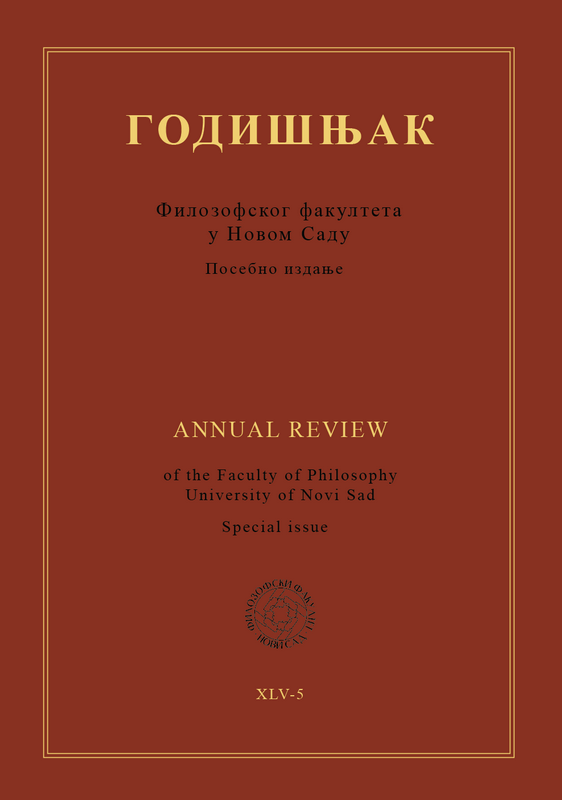SUPPORTIVE MOVES IN THE SPEECH ACT OF DIRECT COMPLAINT IN ENGLISH AND SERBIAN: A CROSS-CULTURAL AND INTERLANGUAGE PRAGMATIC ANALYSIS A Cross-Cultural and Interlanguage Pragmatic Analysis
Main Article Content
Abstract
This paper examines the use of supportive moves in the speech act of direct, face-to-face complaints produced by English and Serbian native speakers in their respective mother tongues, highlighting similarities and differences in their performance. The study also explores how advanced Serbian L1 learners of English use supportive moves in complaints performed in English and especially, whether and to what extent they apply the pragmatic rules of their native language (pragmatic transfer) in doing so. Data were collected through discourse completion tasks (DCTs). The performance of all three groups of participants is compared, with special focus on the contextual variables of social power and severity of complaint. The results of the research indicate that the two cultures are similar with respect to the production of direct complaints, as well as that a low level of pragmatic transfer is observable in the complaint production of the English learners’ group. In order to avoid pragmatic failure in communication in the target language in general, L2 learners need to be exposed to explicit instruction regarding both the linguistic and the cultural conventions in the foreign language, supported by authentic and suitable teaching materials.
Downloads
Article Details
References
Austin, J. L. (1962). How to do things with words. Oxford: Clarendon Press.
Brown, P.–Levinson, S. C. (1987). Politeness: Some universals in language usage. Cambridge: Cambridge University Press.
Crystal, D. (1997). English as a global language. Cambridge: Cambridge University Press.
Eshraghi, A.–Shahrokhi, M. (2016). The Realization of Complaint Strategies among Iranian Female EFL Learners and Female Native English Speakers: A Politeness Perspective. International Journal of English Linguistics, 6(2), 9-20.
House, J.–Kasper, G. (1981). Politeness Markers in English and German. In: Coulmas, F. (Ed.) (1981). Conversational Routines. The Hague: Mouton de Gruyter. 157-185.
Kasper, G.–Dahl, M. (1991). Research Methods in Interlanguage Pragmatics. Studies in Second Language Acquisition, 13(2), 215-247.
Olshtain, E.–Weinbach, L. (1993). Interlanguage features of the speech act of complaining. In: Kasper, G. & Blum-Kulka, S. (eds.) (1993). Interlanguage pragmatics. New York: Oxford University Press. 108-122.
Piotrowska, M. (1987). An Investigation into the Sociolinguistic Competence of Hong Kong University Students with Specific Reference to Making Complaints (Unpublished master’s thesis). Hong Kong University.
Prodanović, M. (2014). Kontrastivna analiza sredstava za ublažavanje govornih činova koji ugrožavaju obraz sagovornika u engleskom i srpskom jeziku. [Contrastive Analysis of Mitigation Devices in Face-threatening Acts in English and Serbian]. (Doctoral dissertation). Faculty of Philology, University of Belgrade.
Prodanović, M. (2016). Raising Pragmatic Awareness in Second Language Acquisition: Comparison of Non-Native and Native Complaints. In: Akbarov, A. (Ed.) (2016). Current Research on Language Learning and Teaching: Case Study of Bosnia and Herzegovina. Newcastle upon Tyne: Cambridge Scholars Publishing. 181-195.
Searle, J. R. (1969). Speech acts: An essay in the philosophy of language. Cambridge: Cambridge University Press.
Searle, J. R. (1975). Indirect Speech Acts. In: Cole, P. & Morgan, J. L. (eds.) (1975). Syntax and Semantics, 3. New York, London: Academic Press. 59-82.
Searle, J. R. (1976). A classification of illocutionary acts. Language in Society, 5, 1-23. Retrieved from: http://dx.doi.org/10.1017/S0047404500006837
Tanck, S. (2002). Speech Act Sets of Refusal and Complaint: A Comparison of Native and Non Native English Speakers’ Production. Studies in Second Language Acquisition, 13, 65-81.
Trosborg, A. (2011). Interlanguage pragmatics: Requests, complaints, and apologies. Berlin: Mouton de Gruyter.




